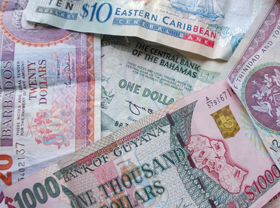Printing money for two centuries
Remittances driving Cuba
Celebrating our heroes
Animating Kingston
 De La Rue: Licence to print money
De La Rue: Licence to print money
It’s a company that not many have heard of or paid much attention to. However, we have all handled their product.
De La Rue, as the world’s largest commercial banknote printing company, is literally a company paid to print money – and it’s currently marking its 200th anniversary.
Checks by Caribbean Intelligence© indicate that the British company prints banknotes for most of the Caribbean including Jamaica, Barbados, the Eastern Caribbean, Trinidad and Tobago, Cuba, Belize, the Bahamas and the Dominican Republic.
In all, 15% of the paper money handled across the world is made by the company, which produces more than 150 currencies.
One of the questions facing De La Rue in its bicentennial year is whether electronic transactions will remove the need for the paper notes in our hands in the future.
Economists argue that there’s still a growing need for cash in emerging markets, but the move to electronic transactions has meant that the cost of printing a bank note has been forced down.
Some 70% of De La Rue’s income comes from banknotes. The rest is from another crucial document – the passport.
 Remiitances keep going up
Remiitances keep going up
In yet another indication of the growing influence of the Caribbean Diaspora, a new study indicates that remittances and the sending home of goods are key driving forces for the Cuban economy.
The study also said that the shipping home of white goods, clothes and other items amounted to $2.5m last year.
The study said: “Barack Obama’s arrival in the White House has directly influenced the increase in money being sent to Cuba.
“Cash remittances in 2012 reached a record US$2.61bn – a 13.5% increase over 2011.
“In other words, cash remittances outweigh government salaries three-to-one.”
The study points out that the remittances have been used by Cubans at home to start up home businesses and that remittance money has now surpassed the hard currency value of the once powerful sugar industry, nickel exports and the production of pharmaceuticals.
“At present, the role the Cuba diaspora plays in developing the island’s economy has never been greater.
“Like it or not, Cuban exiles carry economic clout on the island,” the study concludes.
So how does this compare with remittances to the rest of the Caribbean?
Caribbean Intelligence© has found that according to the Inter-American Development Bank, the Dominican Republic was at the top of the remittance table in 2011, with $3.1bn worth of remittances.
Haiti’s diaspora followed with $2bn – more than a quarter of the country’s income.
For their part, Jamaicans abroad sent home US$2bn in 2011.
These figures were followed by remittances to Guyana (US$401m), Trinidad and Tobago ($131m), Suriname ($114m) and Belize ($107m).
The World Bank predicted at the start of 2013 that remittances for the Caribbean and Latin America will grow over the next three years.
 Celebrating our heroes
Celebrating our heroes
London was the venue this week for the launch of the UK segment of work on the film Hero – about the life of World War II pilot, High Court judge and former diplomat Ulric Cross of Trinidad.
One-third of the documentary/archive/dramatisation film will be shot in Britain later this year.
A news conference at the Trinidad and Tobago High Commission aimed not only to spread the word about the WWII hero, but also to recruit British actors, cameramen, sponsorship and other support for the film.
Hero charts
the life of Ulric Cross across a varied career, which took him from legal training to BBC production work to legal top jobs in the then newly-independent Africa, then on to positions as a High Court and later Appeal Court judge in his native Trinidad.
Justice Cross then later served as Trinidad and Tobago High Commissioner to London between 1990 and 1993.
The film, which will include interviews with its now 96-year-old protagonist, also provides dramatisation of his time growing up in Trinidad and his time as a fighter pilot.
The UK patron for the film, Trinidadian actor Rudolph Walker, told the launch that it would make young people of Caribbean descent “walk ten foot tall” when they saw it.
For more details on the film and a very Trini news conference and UK launch, see our story on Caribbean Intelligence©.
 Kingstoon sold out
Kingstoon sold out
In what seems to be a burgeoning area for Caribbean creativity, the regional film industry has seen another success.
Tickets for Jamaica’s two-day animation conference and festival sold out rapidly this week, prompting organisers to make more seats available.
The Kingstoon event, with the theme of Animating Jamaican Creativity, is to be held on 20 and 21 June on the Mona campus of the University of the West Indies.
The
Festival’s Facebook page states: “Jamaica is set to get a little more animated with the arrival of the Kingstoon Animation Festival, a strategy to position animation as one of the island’s growth areas in the hopes of stimulating the economy and job creation.
“The animation industry has grown to a multi-billion sector internationally and with three studios now under her belt, Jamaica is set to get fine-tooned or, at least, hop onto the animation train before it careens past us. “
The concept has been getting positive feedback.
World Bank Caribbean added its support on Twitter: “Brimming with talented teens, #Kingstoon seeks to turn creativity into a career for Jamaican youth.”
And finally….
We’re preparing to publish our first anniversary issue.
The 12th edition of Caribbean Intelligence© will appear online soon and we’d like to include your views on what we’re doing – right and wrong.
Email us with your comments at caribbeanintelligence@gmail.com .

 De La Rue: Licence to print money
De La Rue: Licence to print money Remiitances keep going up
Remiitances keep going up Celebrating our heroes
Celebrating our heroes Kingstoon sold out
Kingstoon sold out